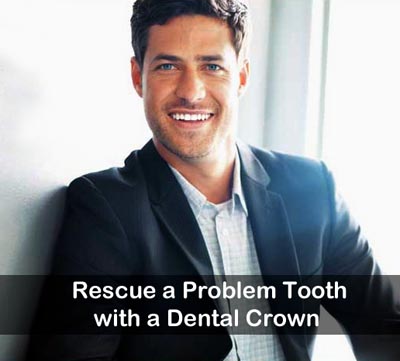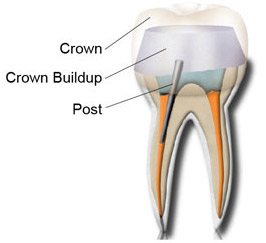 Dental Crowns can save teeth and improve your smile.
Dental Crowns can save teeth and improve your smile.
If your tooth is badly damaged or decayed you may be wondering – will it have to be removed? There’s a “cap”tivating solution…a dental crown.
A dental crown is a tooth-shaped “cover” or “cap” placed over a tooth with consistently incredible results.
While dental crowns have been around a long time, the materials and technology to provide patients with great results continues to improve.
Here are 5 common reasons to need a dental crown:
- A tooth has been broken or severely damaged by decay AND a filling can’t replace enough of the tooth or make the tooth strong enough.
- A tooth has a crack causing pain or a potential break.
- A neighboring tooth is missing and teeth on either side can be crowned to hold a bridge in place.
- A tooth is misshapen or badly discolored and a dental crown can be used to improve appearance.
- A crown is also used to cover a dental implant, a solution for a missing tooth.
.
A crown placed over your original tooth usually lasts at least seven to ten years. In many cases they last much longer.
.
Root Canal First?
If you need a crown, you may also need root canal therapy first. A root canal may be recommended if the tooth has a lot of decay that extends into the root of the tooth, more specifically the pulp. Note: Not everyone who needs a crown also needs a root canal.
 Shoring Up the Tooth’s Foundation
Shoring Up the Tooth’s Foundation
Before placing a crown, you may need a “build-up”. The need to add back a good foundation for a crown exists if the tooth has a lot of decay, damage or portions of the tooth are missing. A post-and-core foundation is also likely after a tooth has benefited from a root canal.
Test Driving Your New Crown
You shouldn’t feel discomfort or sensitivity after a crown is placed. Keep in mind if your tooth has not had a root canal it will still contain the nerve. Therefore you may have some temporary sensitivity to cold. If you do notice pain or sensitivity when you bite down, this often means the crown is too high. This can be adjusted easily.
Caring for Your Crown
You should continue to brush twice a day and floss daily. It is important to ensure that your gums remain healthy and that the crown does not get unnecessary wear from night grinding of teeth. If there is suspicion of clenching or grinding a night, a night guard may be recommended – helping to prolong the life of your dental crown.
What if a Crown Falls Off?
Crowns sometimes fall out. This can be caused by washed-out cement or an improper fit. If this happens:
- If you do not have sensitivity – place the crown in a secure plastic bag & bring it with you to see us.
- With sensitivity or if your appearance is affected, use a toothpick to loosen and remove any cement or debris that is stuck to the crown. Then, you can replace the crown temporarily using denture adhesive or temporary cement sold in many pharmacies.
.
Contact us right away and we will get you in quickly. In some cases the crown can just be re-cemented. Frequently a new crown is needed, and the old crown can be used as a temporary crown.
Here is additional dental crown information courtesy of the American Dental Association:
Keeping teeth helps improve the appearance of your smile and prevents unnecessary shifting of the teeth, as well as bone loss if the tooth is removed.
Dental crowns can be a great solution to several common dental issues. If you have additional questions about dental crowns, please let us know. We are here to help!




